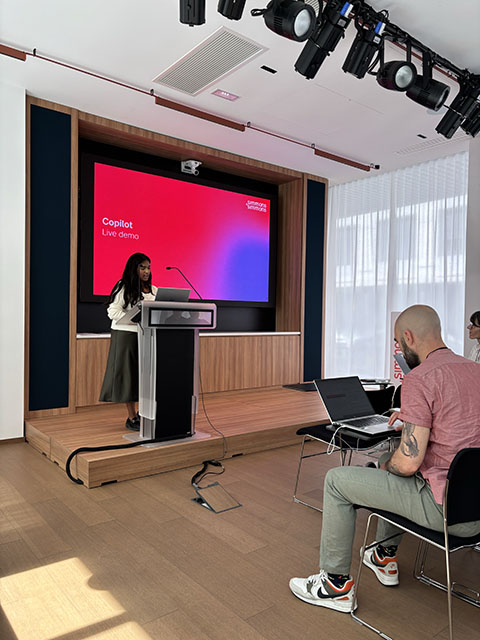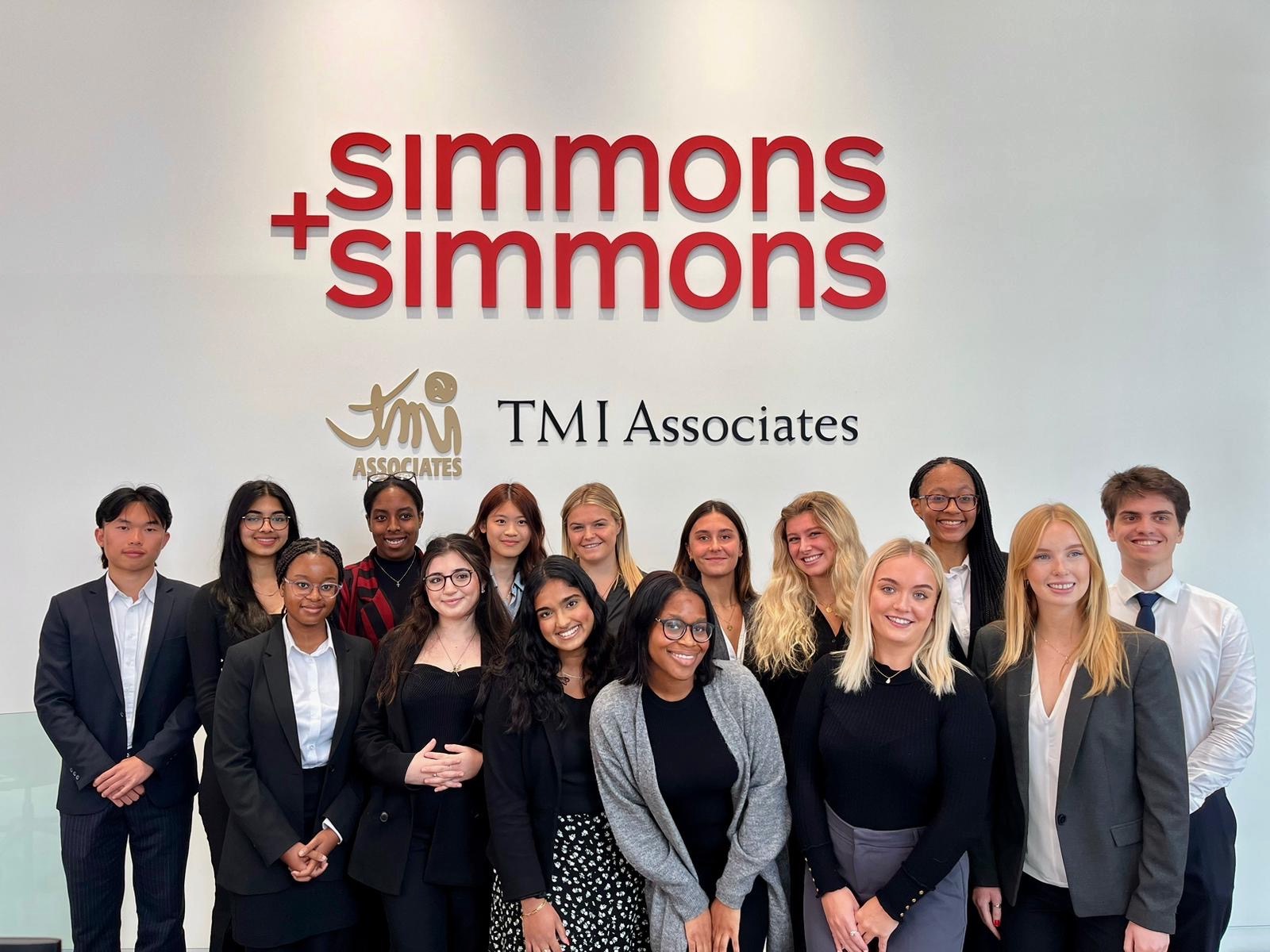Acing the Assessment Centre: Top Tips from a Future Trainee
For aspiring solicitors, the assessment centre is often the decisive stage in the recruitment process – the final step between you and a vacation scheme or training contract. It is not just an academic test, but a holistic assessment of how you think, communicate, and collaborate in simulated professional scenarios.

Assessment centres typically feature case studies, mock client meetings, interviews, group discussions, and reasoning tests. Each element is designed to reflect real-world situations and measure whether you have the skills and the mindset to thrive in legal practice.
At Queen Mary, you have access to a range of resources; from bespoke sessions with the University’s Careers and Enterprise team to workshops run by the School of Law’s Hub for Professional Practice. To prepare, begin using these tools and resources strategically to practise thinking and behaving like a future trainee solicitor.
Here are five tips to help you excel.
Do your homework on the firm
Preparation begins long before the assessment day. Law firms want to see candidates who understand and take a genuine interest in their business – not just the profession in general. They want to see that you understand their business, clients, and culture, and that you’ve chosen them for specific reasons. Thorough research demonstrates motivation and commercial awareness, and it shows that you are thinking like a future trainee.
Go beyond the firm’s website. Look into its key practice areas and industry sectors, recent deals or cases, and any strategic developments such as new offices or growth areas. Understand who its clients are and the types of challenges they face. Pay attention to how the firm describes its values, approach to training, and workplace culture and think about how these align with your own aspirations.
Reading blogs, interviews, and articles from people who work at the firm can give you a more authentic sense of the working environment and the type of work associates are involved in. Don’t hesitate to follow this up by reaching out to current / future trainees on LinkedIn for an informal conversation – many are happy to share their experiences and offer valuable insight that goes beyond what you might find online.
Sharpen core legal skills
Law firms look for sharp thinkers with strong fundamentals. To stand out, invest time in building and maintaining the following core skills:
Reasoning: Practise verbal, numerical, and logical reasoning under timed conditions. Success often comes down to familiarity – regular practice helps you recognise common patterns, build speed, and improve accuracy. Candidates stumble here due to lack of preparation rather than lack of ability. Check out the Careers and Enterprise website for access to various practice tests.
Practical legal skills: Firms aren’t testing your ability to recite case law or memorise statute – by this point they are aware of your academic record. What firms care about is how you apply legal knowledge to practical scenarios. For instance, you might be asked to interpret a statute and explain its impact on a client’s business, draft a summary of a regulatory change, or synthesise various sources of legal information into a concise briefing note.
Firms want to see that you can bridge theory and practice. That means demonstrating your ability to:
- Analyse complex information and distil it into clear, actionable advice
- Communicate legal concepts effectively to non-lawyers (i.e. clients)
- Read and interpret documents critically, identifying key issues and implications
- Apply legal principles to new situations with sound judgment and commercial awareness
Commercial awareness: Stay up to date with business and legal developments. Read from a variety of sources such as the Financial Times and Watson’s Daily. If you aren’t sure where to start, check out QMUL’s Reimagine Law podcast on Spotify which covers a variety of practical and commercial legal topics. Following key topics and connecting with experts on LinkedIn can turn your feed into a daily source of insight, helping you stay informed on emerging trends and engaged with a variety of industry perspectives.
Be prepared to discuss current events and their implications for clients and firms. Commercial awareness isn’t about quoting headlines – it’s about showing you understand how external factors shape legal strategy. For example: How might tariffs impact a client’s operations? What risks or opportunities might new regulations create?
Prepare for case studies and client exercises
Case studies and client role plays can feel daunting, but remember: firms aren’t looking for an associate-level performance, they are looking for potential. The key to success is showing that you can approach unfamiliar information logically and methodically, prioritise what matters most, and deliver advice that is both legally sound and commercially practical.
Start by structuring your analysis clearly, breaking the problem down into key issues before moving to your recommendations. Verbalise your thought process as you work through a problem; this helps assessors follow your reasoning, even if your final conclusion isn’t perfect. When making recommendations, always return to the client’s objectives. Firms value trainees who see the bigger picture rather than getting lost in technical detail. Being able to explain complex legal points in a straightforward, solution-focused way shows that you can bridge the gap between technical knowledge and client need.
Using online resources like mock case studies, sample client scenarios, or past assessment materials can help you refine these skills and build confidence before the real thing. Resources such as The Corporate Law Academy offer mock case studies and further advice from successful candidates who have passed the assessment centre stage.
Collaborate and contribute meaningfully to group exercises
Group exercises are a common feature of assessment centres and are designed to evaluate how you work with others under pressure. You might be asked to solve a client problem, develop a strategic recommendation, or prepare a short pitch as a team. Assessors observe not just what you contribute, but how you contribute – paying close attention to your communication style, interpersonal skills, and ability to collaborate effectively. Firms want to see that you can contribute valuable ideas and drive progress while also listening, adapting, and building consensus.
Active participation is essential. Listening carefully to others, acknowledging their points, and building on their suggestions shows that you value collaboration. At the same time, try to add structure and momentum to the discussion – summarise key points, suggest next steps, or raise thoughtful questions to move the conversation forward. Staying focused on the client brief and objectives throughout the exercise demonstrates commercial awareness and good judgment. Avoid two common pitfalls: dominating the discussion: which can signal a lack of teamwork or fading into the background: which may suggest a lack of confidence or initiative.
Demonstrating empathy, clear communication, and solution-oriented thinking will leave a strong impression. Even small actions such as encouraging quieter members to contribute or helping the group refocus when time is short can show leadership without taking over. Approach the task as an opportunity to showcase the collaborative and client-focused mindset that firms look for in their trainees.

Excel in Partner Interviews
For many candidates, interviews with partners and associates can be the most nerve-wracking part of the assessment centre. These conversations are designed to go beyond your CV – they test your motivation, commercial judgment, resilience, and interpersonal skills. A useful way to structure your answers is by using the STAR method (Situation, Task, Action, Result), which helps you present examples clearly and concisely while highlighting your impact and what you learned. Using this approach ensures that your responses are well-organised and focused, particularly when discussing past experiences or achievements. Remember; firms are interested in assessing not just what you have done, but how you reflect on those experiences. Emphasise learning and growth, not just achievement.
Interview questions often include scenario-based or behavioural elements that assess how you think and respond in real-world situations. You might be asked how you have previously approached working with demanding people, managed conflict within a team, or navigated an ethical dilemma. These questions are designed to reveal your judgment, problem-solving skills, and ability to stay composed under pressure. Firms will typically list key competencies they are looking for on their recruitment resources and website. When answering, always link your responses back to those key competencies such as teamwork, communication, adaptability, and commercial awareness. Where relevant, also ensure you reflect on how your experiences align with the firm’s values and practice areas.
Finally, remember that interviews are a two-way conversation. Partners and associates are assessing whether you would represent the firm well in front of clients, so professionalism, confidence, and authenticity are key. Asking thoughtful questions about the firm’s work, training, or strategy shows genuine curiosity and engagement.
Approaching the interview as a conversation rather than an exam will help you build rapport and demonstrate that you are not only capable of doing the work, but also a strong cultural fit for the firm. So, bring your curiosity, ask thoughtful questions, and show genuine interest and enthusiasm for the work.
Final thoughts
Assessment centres are intentionally challenging, but they are also your stage to demonstrate that you have the potential to thrive as a trainee solicitor. Preparation, professionalism, and authenticity will help you stand out. If one task doesn’t go well, don’t let it derail your performance. Resilience is a quality firms actively assess. Reset, refocus, and treat each exercise as a fresh opportunity.
As a Queen Mary law student, you have access to various supports including mock interviews, one-to-one guidance with careers advisors as well as a network of peers who have been in the same boat and are willing to share their advice and support you. Use these resources strategically, combine them with your own preparation, and approach the assessment centre not as an exam to ‘pass’, but as an opportunity to showcase your potential as a future trainee solicitor.
Good luck – you’ve got this!
By Vandy Widyalankara, Final Year Law Student
